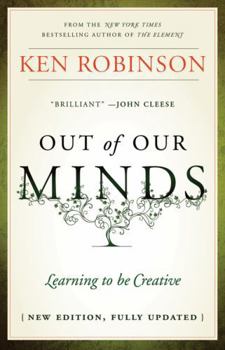Out of Our Minds: Learning to Be Creative
Select Format
Select Condition 
Book Overview
"It is often said that education and training are the keys to the future. They are, but a key can be turned in two directions. Turn it one way andyou lock resources away, even from those they belong to. Turn it the otherway and you release resources and give people back to themselves. To realizeour true creative potential'in our organizations, in our schools and in our communities'we need to think differently about ourselves and to actdifferently...
Format:Hardcover
Language:English
ISBN:1907312471
ISBN13:9781907312472
Release Date:February 2011
Publisher:Capstone
Length:352 Pages
Weight:1.15 lbs.
Dimensions:1.1" x 5.6" x 8.5"
Customer Reviews
5 ratings
A wonderful book by a great mind
Published by Thriftbooks.com User , 17 years ago
I heard Ken Robinson speak on a C-Span program and was quite taken by his mastery of the topic of education and sociology, so I bought one of his books Out of Our Minds... is terrific, and it is no wonder huge corporations seek this man's advice on a myriad of issues. I am in education, and the book is a relevant and informative addition to my reference library.
Essential Reading for Teachers!
Published by Thriftbooks.com User , 17 years ago
'Out of Our Minds: Learning to be Creative' by Ken Robinson is one of the 'must read' books for modern classroom teachers. Robinson challenges many of the widely held beliefs and processes of education found in the majority of western countries. In a time of rapidly changing social and educational climates, the ideas that are raised in this book allows teachers to consider the real purpose of educating students for a modern society.
What education really needs
Published by Thriftbooks.com User , 18 years ago
While Robinson perhaps uses more words than necessary to make his point, I found this book refreshing because it gets to the heart of the failures in our education system that few others seem to see. The focus of education reform today is on testing to verify that all students learn certain basic facts, e.g. no child left behind. There is some merit to the new attention paid to accountability for outcomes. However, as Robinson clearly points out, the real issue is that we are not helping our students to understand and leverage their own unique talents, and we are not preparing them to deal collaboratively with a world where there are few black and white answers. Until we as a society properly identify the problem, any solutions that emerge are guaranteed to fall short--no matter how well intentioned. I found the book to be short on guidance about solutions and approaches that can address the core issues, but at least it gets the problem in front of anyone who reads it.
Brilliant
Published by Thriftbooks.com User , 23 years ago
Sometimes a writer has an uncanny kknack of sharply focusing something which up until then you had not seen in all its simplicity and brilliance. This book does that but at the next moment it makes connections never before imagained. Even the most obstinately prosaic and safe thinkers will be tempted out of their box by Ken Robinson's ideas, theories and speculations. What's more, he writes as he speaks, in a way that, magnetically and compulsively, is simply irresistible.
Intellectually Challenging & Humorous
Published by Thriftbooks.com User , 23 years ago
There are certain books that manage to be authoritative, entertaining and thought-provoking and are also well-written and richly exemplified. Few authors are able to fashion this attractive mixture. Alvin Toffler and Charles Handy can craft it, and in education, David Hargreaves has the knack. I shall add Ken Robinson's absorbing account of creativity to my personal list of gems. Creativity is one of those topics that excites some and enrages others. In the wrong hands it can be twee, syrupy, smug, territorial, giving the impression that you have to belong to a special club, with its own argot and conventions. For Ken Robinson it is none of these, but rather a universal talent that people have, often without realising it. Society in general, and education in particular, can squash the imagination and rock children's self-confidence. What I like about this book is the breadth of its scope ... and the fascinating little stories that illustrate the points being made, tales from history, social and economic background factors, test items, incidents from school life. The book is peppered with these vividly recounted vignettes about thinking and learning, or lack of it ... Many of the illustrations and anecdotes are personal to the author, about people he has met inside and outside the university world, organisations he knows, stories he has been told. Robinson's line of argument is carefully constructed through the seven chapters ... Because imagination and invention do not progress in straight lines, or along predictable routes, whole organisations must create and sustain a culture that promotes creativity, rather than stifles it. On the surface, relatively little of this book is directly about education, for many of the chapters describe society generally, human functioning, the arts, and the imagination. But you could also argue that all of it is about education. ... I was sorry to reach the end of the text, as it had maintained its momentum throughout. The reading may finish, but the thinking goes on, just as you would expect from a book on this intriguing subject.





